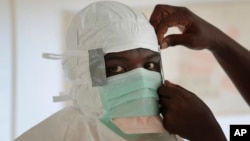It is easy to miss the Paris office of Medecins Sans Frontieres, also known to millions worldwide as Doctors Without Borders. There is no sign on the slightly shabby white building, just the red MSF logo on the door.
A poster in the elevator offers tips on avoiding the common flu. But these days, MSF is battling a more exotic killer: Ebola. The humanitarian group has been on the front lines of West Africa's outbreak since it exploded early this year.
In some ways, says MSF France General Director Stephane Roques, it was a matter of being at the right place at the right time. Staff already were present in Guinea when the first Ebola cases were identified. The virus quickly spread to neighboring Liberia and Sierra Leone, sickening and killing thousands, and overwhelming local health services.
To date, it has infected more than 13,000 people and killed at least 5,160.
An early responder
Roques said MSF was practically alone at the beginning, except for local health staff. He praised the bravery of African doctors and nurses who risked and sometimes lost their lives in treating Ebola patients.
MSF also has paid a price. It has tripled its staff to about 3,500 to meet the soaring caseload. About two dozen of its people have contracted the virus. More than half, mostly local staff, have died from it.
Today, Roques said, it is hard to say just how and when the outbreak will be contained.
But as Ebola spreads to new pockets of the three West African countries, Roques says the response must be adapted. Along with treating patients in large, urban hospitals, the group wants to send small, mobile teams to hot spots as they flare up. MSF also wants to open a health center in Monrovia to handle common health problems, like malaria or difficult births, that have been sidelined by the crisis.
A vocal critic
MSF has sharply criticized the international response to the outbreak as slow and inadequate. Its international president, Joanne Liu, delivered that message to the United Nations in September.
"Doctors Without Borders/Médecins Sans Frontières has been ringing alarm bells for months, but the response has been too little, too late," she said then. "... While funding announcements, roadmaps, and finding vaccines and treatments are welcome, they will not stop the epidemic today."
Speaking out has been a classic MSF tactic since its founding in France four decades ago. The organization has earned praise, donations and a Nobel Peace prize in 1999, not only for saving lives, but also for condemning injustices – sometimes getting kicked out of countries for doing so.
Even aid agencies sometimes criticize MSF's brash, go-it-alone approach.
Speaking out, says humanitarian response analyst Simon Levine of Britain's Overseas Development Institute, is not always the best policy.
"Some of us would probably say they [MSF] enjoy criticizing even when their criticism may not be entirely fair, and when it is not always productive. Some of us would hesitate and go, 'You know, you are banging a drum, and maybe a quieter word would have been more useful.' But that is MSF's style."
'They have been extremely brave'
But the Ebola outbreak – and the massive needs in the affected countries – seem to fit both MSF's style and its abilities.
"So for lots of reasons ... it was there, it is operational, it has an emergency operational capacities probably unparalleled among the international agencies,” Levine said. "So it was only natural that they [MSF] would be the main responder. … They have been extremely brave ... and all the credit to them."
Tropical disease specialist Estrella Lasry has returned to France from Liberia, where the infection rate seems to be slowing but Ebola is still winning.
"It seems like we keep running behind and trying to catch up with the epidemic and we are not able to totally catch up," Lasry said.
"That is very different from other epidemics," she continued. "Even with cholera, for example, we managed to reach a very low mortality in the intervention in Haiti. Here, we are … months into the epidemic and we still have mortality rates in some of our centers of 60 percent."
The hardest part is watching Ebola patients suffer and die alone, Lasry said. But she notes there is solidarity among the patients, and stories of hope and survival. She plans to head back to Liberia soon to be part of them.






